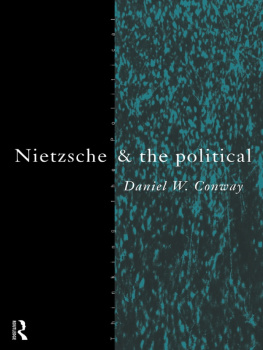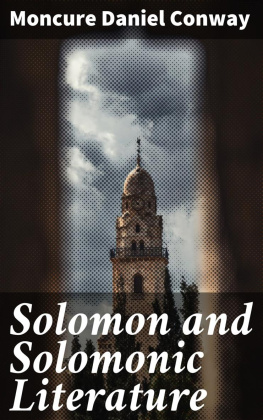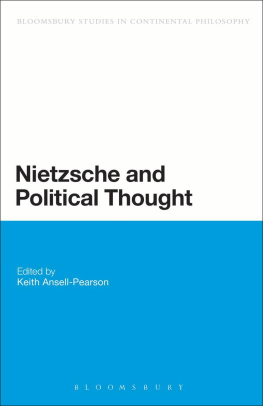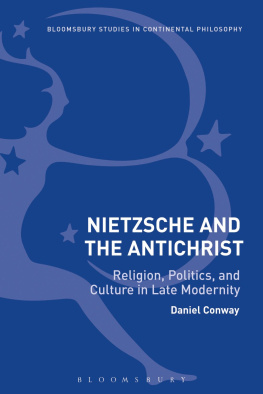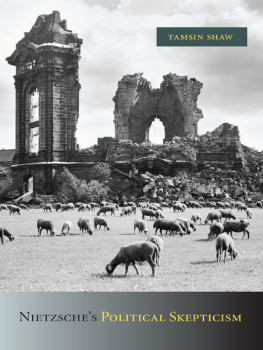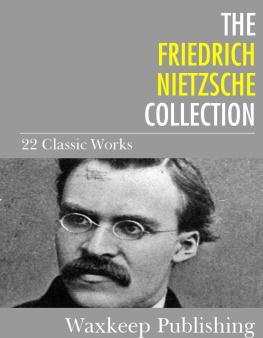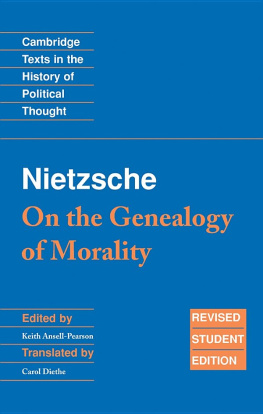Conway Daniel W. - Nietzsche & the political
Here you can read online Conway Daniel W. - Nietzsche & the political full text of the book (entire story) in english for free. Download pdf and epub, get meaning, cover and reviews about this ebook. City: London, year: 2006, publisher: Routledge, genre: Science. Description of the work, (preface) as well as reviews are available. Best literature library LitArk.com created for fans of good reading and offers a wide selection of genres:
Romance novel
Science fiction
Adventure
Detective
Science
History
Home and family
Prose
Art
Politics
Computer
Non-fiction
Religion
Business
Children
Humor
Choose a favorite category and find really read worthwhile books. Enjoy immersion in the world of imagination, feel the emotions of the characters or learn something new for yourself, make an fascinating discovery.
- Book:Nietzsche & the political
- Author:
- Publisher:Routledge
- Genre:
- Year:2006
- City:London
- Rating:4 / 5
- Favourites:Add to favourites
- Your mark:
- 80
- 1
- 2
- 3
- 4
- 5
Nietzsche & the political: summary, description and annotation
We offer to read an annotation, description, summary or preface (depends on what the author of the book "Nietzsche & the political" wrote himself). If you haven't found the necessary information about the book — write in the comments, we will try to find it.
Nietzsche & the political — read online for free the complete book (whole text) full work
Below is the text of the book, divided by pages. System saving the place of the last page read, allows you to conveniently read the book "Nietzsche & the political" online for free, without having to search again every time where you left off. Put a bookmark, and you can go to the page where you finished reading at any time.
Font size:
Interval:
Bookmark:

Nietzsches political thought has long been dismissed for its alleged naivet and its antiliberal excesses. Yet, far from being of merely historical interest, his critique of late modernity in fact suggests a compelling alternative to the political models advanced by liberal, communitarian and postmodern theorists.
In Nietzsche & the Political, Daniel W.Conway takes Nietzsche seriously as a political thinker. Unlike other writers on the subject, Conway neither idolizes not demonizes. He carefully explores the consequences of Nietzsches critique of modernity for his political thought from his earliest writings through to his mature work. Conways clear and even-handed analysis is free from the obfuscatory jargon often associated with Nietzsche scholarship.
Nietzsche & the Political is a comprehensive introduction to Nietzsches political thought. It also offers a thorough survey of Nietzsches political legacy, including his influence on such seminal thinkers as Foucault and Habermas and his continuing importance to contemporary liberalism and feminist theory. It will be required reading for students of Nietzsche in philosophy, politics and sociology.
Daniel W.Conway is Associate Professor of Philosophy and Director of the Center for Ethics and Value Inquiry at Pennsylvania State University. He is the co-editor of The Politics of Irony and Nietzsche und die antike Philosophie.
General editors:
Keith Ansell-Pearson, University of Warwick
Simon Critchley, University of Essex
Recent decades have seen the emergence of a distinct and challenging body of work by a number of Continental thinkers that has fundamentally altered the way in which philosophical questions are conceived and discussed. This work poses a major challenge to anyone wishing to define the essentially contestable concept of the political and to think anew the political import and application of philosophy. How does recent thinking on time, history, language, humanity, alterity, desire, sexuality, gender and culture open up the possibility of thinking the political anew? What are the implications of such thinking for our understanding of and relation to the leading ideologies of the modern world, such as liberalism, socialism and Marxism? What are the political responsibilities of philosophy in the face of the new world (dis)order?
This new series is designed to present the work of the major continental thinkers of our time, and the political debates their work has generated, to a wider audience in philosophy and in political, social and cultural theory. The aim is neither to dissolve the specificity of the philosophical into the political nor evade the challenge that the political poses the philosophical; rather, each volume in the series will try to show how it is only in the relation between the two that new possibilities of thought and politics can be activated.
Already published:
- Foucault and the Political by Jon Simons
- Derrida and the Political by Richard Beardsworth
First published 1997
by Routledge
11 New Fetter Lane, London EC4P 4EE
This edition published in the Taylor & Francis e-Library, 2005.
To purchase your own copy of this or any of Taylor & Francis or Routledges collection of thousands of eBooks please go to www.eBookstore.tandf.co.uk.
Simultaneously published in the USA and Canada
by Routledge
20 West 35th Street, New York, NY 10001
1997 Daniel W.Conway
All rights reserved. No part of this book may be reprinted or reproduced or utilized in any form or by any electronic, mechanical, or other means, now known or hereafter invented, including photocopying and recording, or in any information storage or retrieval system, without permission in writing from the publishers.
British Library Cataloguing in Publication Data
A catalogue record for this book is available from the British Library.
Library of Congress Cataloging in Publication Data
Conway, Daniel W.
Nietzsche and the political/Daniel W.Conway.
p. cm.(Thinking the political)
Includes bibliographical references and index.
ISBN 0-415-10068-2 (Print Edition). ISBN 0-415-10069-0 (pbk.)
1. Nietzsche, Friedrich Wilhelm, 18441900Contributions in political science. I. Title. II. Series.
JC233.N52C65 1996
320.01dc20 967867 CIP
ISBN 0-203-97938-9 Master e-book ISBN
ISBN 0-415-10068-2 (hbk)
ISBN 0-415-10069-0 (pbk)
For Shannon
This book developed as a product of my friendship with Keith Ansell Pearson and David Owen, to whom I am deeply indebted for their encouragement and criticism. I am also grateful to Graham Parkes and Tracy Strong, both of whom read the entire manuscript and judiciously suggested salutary revisions. I am furthermore indebted to the many friends and colleagues who have discussed Nietzsches political philosophy with me over the years, including Panos Alexakos, Babette Babich, Debra Bergoffen, Ann-Marie Bowery, Howard Caygill, William Connolly, Claudia Crawford, Simon Critchley, Brian Domino, Shannon Duval, Robert Gooding-Williams, Kathleen Higgins, Robert Irelan, Salim Kemal, Laurence Lampert, Duncan Large, Bernd Magnus, Alexander Nehamas, Kelly Oliver, Robert Pippin, Stanley Rosen, Richard Schacht, Alan Schrift, Charles Scott, Gary Shapiro, David Stern, John Seery, Robert Solomon, and Michael Zimmerman. The research for this book was made possible by a generous grant from the Research and Graduate Studies Office of the College of the Liberal Arts at The Pennsylvania State University; my special thanks to Dean Susan Welch and Associate Dean Raymond Lombra. Finally, I gratefully acknowledge permission to use portions of the following publications:
Das Weib an sich: The Slave Revolt in Epistemology, in Nietzsche: Feminism and Political Theory, ed. Paul Patton (London: Routledge, 1993), pp. 110129.
Loves Labours Lost: The Philosophers Versucherkunst, in Nietzsche,Philosophy and the Arts, eds Daniel W. Conway and Salim Kemal (Cambridge: Cambridge University Press).
Autonomy and Authenticity: How One Becomes What One Is, St. JohnsReview, vol. XLII, no. 2, May 1994, pp. 2739.
Comedians of the Ascetic Ideal: The Performance of Genealogy, in ThePolitics of Irony: Essays in Self-Betrayal, eds Daniel W.Conway and John E.Seery (New York: St. Martins Press, 1992), pp. 7395.
Foucault, Michel, The Encyclopedia of Philosophy, Supplement, ed. David M.Borchert (Macmillan and Co.), pp. 201202.
All references to Nietzsches works appear in the body of the text; individual writings are identified by the abbreviations listed below.
Rather than giving page references to any one particular edition, I have adopted a system that is widely used in Nietzsche scholarship and allows readers to identify the passages cited whatever edition they may be using:
- All arabic numbers denote sections. For instance, GS 238 refers to section 238 of The Gay Science.
- All roman numbers denote parts or standard subdivisions in those works of Nietzsche where section numbers start anew with each part or subdivision. Thus GM 11:21 refers to the Genealogy of Morals, essay II, section 21; and TI VII:3 refers to Twilight of the Idols, essay VII, section 3.
- Citations from the preface of a particular work are identified by P, as in EH P:4a reference to
Font size:
Interval:
Bookmark:
Similar books «Nietzsche & the political»
Look at similar books to Nietzsche & the political. We have selected literature similar in name and meaning in the hope of providing readers with more options to find new, interesting, not yet read works.
Discussion, reviews of the book Nietzsche & the political and just readers' own opinions. Leave your comments, write what you think about the work, its meaning or the main characters. Specify what exactly you liked and what you didn't like, and why you think so.

